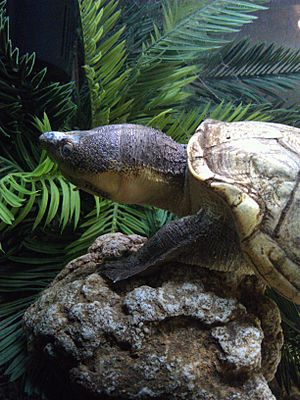Rough-footed mud turtle facts for kids
Quick facts for kids Rough-footed mud turtle |
|
|---|---|
 |
|
| Conservation status | |
| Scientific classification |
|
| Kingdom: | Animalia |
| Phylum: | Chordata |
| Class: | Reptilia |
| Order: | Testudines |
| Suborder: | Cryptodira |
| Family: | Kinosternidae |
| Genus: | Kinosternon |
| Species: |
K. hirtipes
|
| Binomial name | |
| Kinosternon hirtipes (Wagler, 1830)
|
|
| Script error: The function "autoWithCaption" does not exist. | |
| Synonyms | |
|
|
Script error: No such module "Check for conflicting parameters".
The rough-footed mud turtle (Kinosternon hirtipes) is a type of mud turtle that lives in wet, muddy places. It belongs to the family called Kinosternidae. These turtles are found only in the southwestern United States and northern Mexico. This means they are endemic to these areas.
Contents
Where Rough-Footed Mud Turtles Live
K. hirtipes turtles can be found in the United States in the state of Texas. They also live in many parts of Mexico. These Mexican states include Aguascalientes, Chihuahua, Coahuila, Mexico DF, Durango, Guanajuato, Jalisco, Mexico State, Michoacán, Morelos, and Zacatecas.
What Rough-Footed Mud Turtles Eat
Rough-footed mud turtles are omnivores, which means they eat both plants and animals. Their main diet includes plants like algae, seeds, and fruits. They also enjoy eating insects that live in water, on land, or that can fly. Small water snails are also part of their meals.
As these turtles grow bigger, their diet changes. They start eating more plants and fewer insects. This change helps them grow quickly. Even though male turtles are usually larger than females, both eat similar kinds of food.
Who Hunts Rough-Footed Mud Turtles
The main animals that hunt K. hirtipes turtles are raccoons and feral pigs. We know this from tracks found near where turtles were eaten. We also see bite marks and damage on their shells. Raccoons and pigs are known to hunt other types of turtles too.
These turtles are generally quite safe from predators. However, they are most at risk when they leave the water to lay their eggs. This is when they are easiest for predators to find.
Different Types of Rough-Footed Mud Turtles
There are six recognized types, or subspecies, of the rough-footed mud turtle. Each subspecies has slightly different features or lives in a specific area. One of these subspecies is now extinct.
- Valley of Mexico mud turtle – Kinosternon hirtipes hirtipes (Wagler, 1830)
- Lake Chapala mud turtle – Kinosternon hirtipes chapalaense Iverson, 1981
- San Juanico mud turtle – Kinosternon hirtipes magdalense Iverson, 1981
- Viesca mud turtle – Kinosternon hirtipes megacephalum Iverson, 1981 (This subspecies is no longer alive, it is extinct.)
- Mexican Plateau mud turtle – Kinosternon hirtipes murrayi Glass & Hartweg, 1951
- Patzcuarco mud turtle – Kinosternon hirtipes tarascense Iverson, 1981
Why the Name "Murrayi"?
One of the subspecies, murrayi, was named to honor an American zoologist named Leo Tildon Murray. He lived from 1902 to 1958 and studied animals.
See also
 In Spanish: Tortuga de pantano de México para niños
In Spanish: Tortuga de pantano de México para niños
 | John T. Biggers |
 | Thomas Blackshear |
 | Mark Bradford |
 | Beverly Buchanan |


